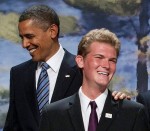Mexico has been plagued with a horrible reputation as of late. Swine flu, drug wars and government corruption have all tarnished the image of the country. But behind that entire PR mess is a thriving economy, one that was fixed in part by a politician, an economist and a billionaire businessman. Let’s meet them:
 Felipe Calderón: Mexico’s current President, a member of the conservative National Action Party (PAN), has been a figure inthe international press since the launch of his drug war (death toll ranging from 30,000 – 40,000) in 2006. Aside from that, his administration has kept up efforts to increase economic competitiveness and boost economic growth, specifically making investments in efficient, renewable energies.
Felipe Calderón: Mexico’s current President, a member of the conservative National Action Party (PAN), has been a figure inthe international press since the launch of his drug war (death toll ranging from 30,000 – 40,000) in 2006. Aside from that, his administration has kept up efforts to increase economic competitiveness and boost economic growth, specifically making investments in efficient, renewable energies.
In the past year, Mexico has moved up nine spots in the IMD’s 2011 World Competitiveness Yearbook to No. 38 out of 59 countries evaluated. It was also ranked as the No. 2 most competitive economy in Latin America, bested only by Chile and surprisingly overcoming Brazil. These increases can be attributed to Calderon and PAN’s advocating of free enterprise and FTAs (including NAFTA), privatization and liberal reforms. It definitely seems as though Calderón and his administration are doing something right.
 Agustín Carstens: Often viewed as a more important figure in Mexico than Calderón is Agustín Carstens, the director of Mexico’s central bank. He is responsible for reducing inflation from double digits and was even able to grow Mexico’s GDP 5.5% in 2010 through increased exports (slowly decreasing dependence on U.S.) and conservative policies.
Agustín Carstens: Often viewed as a more important figure in Mexico than Calderón is Agustín Carstens, the director of Mexico’s central bank. He is responsible for reducing inflation from double digits and was even able to grow Mexico’s GDP 5.5% in 2010 through increased exports (slowly decreasing dependence on U.S.) and conservative policies.
Carstens is skillfully maneuvering Mexico through the recession by allowing market control of interest rates and open trade and investment regimes. Unlike other Latin American economies, Mexico yet to hike interest rates and has no immediate plans to do so due to favorable inflation forecasts. His successful tenure at the central bank has placed the economist at the top of the short-list to become the next Managing Director of the IMF.
 Carlos Slim: You can hate him (his monopolistic telephone companies have notoriously horrific coverage and customer service), but you have to admit he has done a lot for Mexico’s growth over the past 10 years. Slim is a firm believer in economic growth through job creation, and currently employs more than 200,000 people throughout Latin America within his companies. The magnate and philanthropist will continue to help stabilize and move Mexico forward with more than USD 3bn in investments in telecommunications systems, infrastructure and mining industries in Mexico alone (another USD 5bn in Latin America). I suppose the world’s richest man according to Forbes should “pay it forward” to his country in one way or another.
Carlos Slim: You can hate him (his monopolistic telephone companies have notoriously horrific coverage and customer service), but you have to admit he has done a lot for Mexico’s growth over the past 10 years. Slim is a firm believer in economic growth through job creation, and currently employs more than 200,000 people throughout Latin America within his companies. The magnate and philanthropist will continue to help stabilize and move Mexico forward with more than USD 3bn in investments in telecommunications systems, infrastructure and mining industries in Mexico alone (another USD 5bn in Latin America). I suppose the world’s richest man according to Forbes should “pay it forward” to his country in one way or another.
There are clearly more factors that play into Mexico’s economic growth, but the impact these policies have had on a previously stagnant economy cannot be ignored. Open trade relations and increased confidence in government, coupled with conservative monetary policies and the pocketbook of a billionaire, have all helped poised the country to enter the Top 10 largest economies by 2020. Good work, guys.



